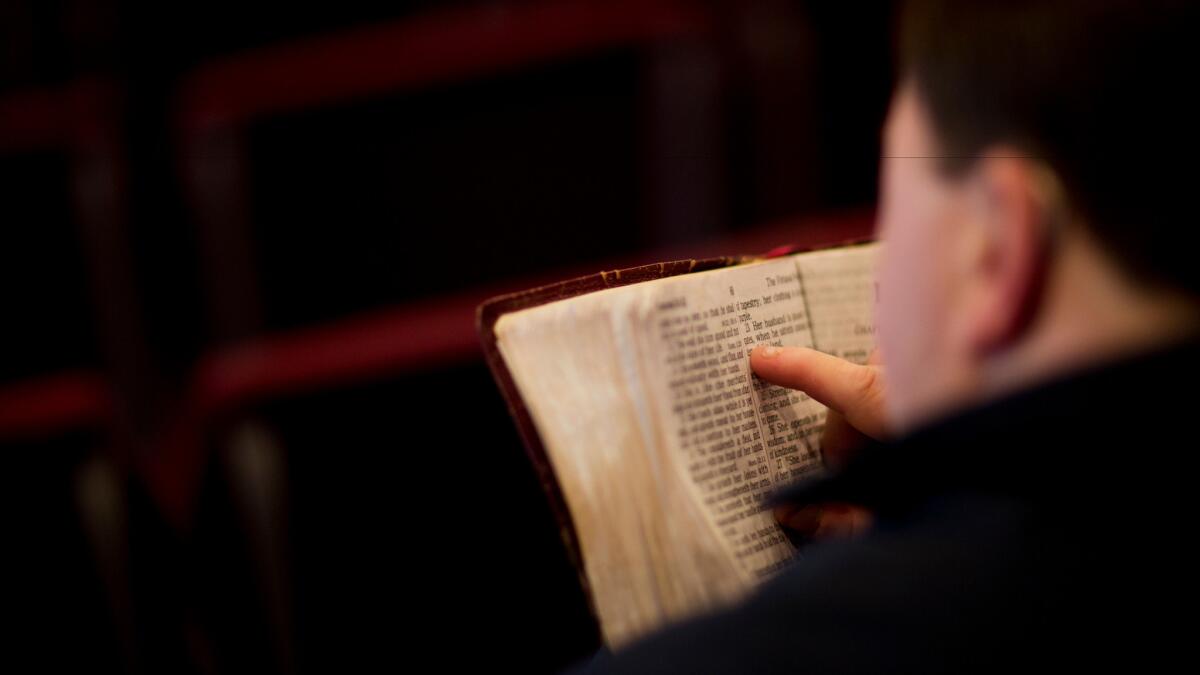Op-Ed: Atheists and believers are reading the Bible the wrong way

- Share via
Believers read the Bible as the word of God. That is not always easy. Many biblical stories do not speak clearly to modern ears. People seek the help of theologians to wrest lessons from its opaque verses, but theologians often disagree.
Nonbelievers, and in particular the vehement group known as New Atheists, argue that Holy Writ has nothing to say at all. Author Sam Harris, for instance, bets that if you enter a bookstore and pick a random book off its shelf, it would have more “relevance and more wisdom for the 21st century than the Bible.” And evolutionary biologist Richard Dawkins maintains that its contents are “just plain weird, as you would expect of a chaotically cobbled-together anthology of disjointed documents.” At best, they argue, the Bible has literary value and can serve as a helpful source of pithy aphorisms.
The Bible, then, has it coming from both sides. This may explain why today hardly anyone still reads the Old Testament beyond Genesis. That is unfortunate, because the Good Book is neither incomprehensible nor nonsensical. We just have to read it in a new way: as humanity’s diary.
People keep diaries to make sense of the maelstrom of everyday events, and there was a lot to mull over during the time the Bible was written and the preceding millennia, when some of its stories took shape. The Bible’s texts echo the consequences of humans moving from living off the land to producing food themselves. The adoption of agriculture was unprecedented in the evolution of life on Earth. Wherever this radical shift happened, it touched off a cultural big bang.
The new agriculturalists had to toil for long hours and contend with droughts, floods and damage to crops and stores. Devastating epidemics arose as a result of the new lifestyle: sedentary, in densely packed villages and in intimate contact with farm animals. Humans got smaller and died younger. Women began to have trouble giving birth. As states arose sometime later, and with them much more systematic inequality and violence, as well as dirty, overcrowded cities, things only got worse. Old customs became counterproductive and new, more effective ones had to be invented, fast.
The Bible has to be read against this background. The authors reasoned like everyone else did in those days. They explained events as actions by invisible actors, and bigger events, such as natural disasters, meant bigger actors — gods — were at work. In an interesting freak of history, the storytellers of the Bible added this persuasive innovation: There is just one, all-powerful God, whose anger is aroused by particular human actions, which leads him to correct those disobeying his wishes, often by punishing the collective, as in epidemics, earthquakes or floods — events we still call acts of God.
The Bible was an ambitious attempt to come to grips with new challenges to our earthly existence ... at a time well before we had natural science to help.
If a single God is responsible for all calamities, terrible events become almost predictable and preventable. The writers of the Bible therefore produced rule after rule — the Ten Commandments are just the beginning — with a single goal in mind: to keep from provoking God’s wrath again.
As time went by, it became clear that even strict adherence to the rules could not guarantee peace and prosperity. So the Bible’s authors did what good scientists today would do: They adjusted their explanatory model. For instance, illness and catastrophe were God’s punishment in the early books of the Old Testament; by the time of the New Testament, they had become the work of the devil and his demons.
And so, for more than 1,000 years, many authors added new stories — about Job and the Apocalypse, for example — to humanity’s collective diary and continued to edit older texts, and so kept it up to date. But by the 5th century CE the emerging Christian church needed to establish its authority. The Bible was canonized; it became Holy Writ: the perfect word of a perfect God. It was eternal, unchangeable, and thus its explanatory model grew increasingly outdated. No wonder exegesis became ever more convoluted.
Viewed from this cultural evolution perspective, the Bible was an ambitious attempt to come to grips with new challenges to our earthly existence — pestilence, injustice, war, suppression — at a time well before we had natural science to help. Of course, it got much of its explanations wrong, and most of us no longer accept them as accurate.
But modern evolutionary biology has confirmed that the Good Book got its fundamental picture of human nature right. If many of us today feel a sense of longing for paradise, it is because we live in a world for which we were not really made. Our innate psychology prepares us to live in small groups of mobile hunter-gatherers, virtually without property, where brothers are each other’s best allies, where the need to share everything cuts down on competition and conflict as we struggle to survive against nature, where men and women are nearly equals, and where we do not have to rely on abstract laws to sort out conflicts.
The Bible therefore reflects enduring human concerns hailing back to our days as hunter-gatherers: We hate injustice, despotism and excessive wealth and yearn for belonging, for community and for a peaceful life. When we read the Bible as humanity’s diary, we will find it offers surprisingly deep insights into every aspect of our human nature.
Carel van Schaik and Kai Michel are the authors of “The Good Book of Human Nature: An Evolutionary Reading of the Bible.”
Follow the Opinion section on Twitter @latimesopinion and Facebook
More to Read
A cure for the common opinion
Get thought-provoking perspectives with our weekly newsletter.
You may occasionally receive promotional content from the Los Angeles Times.






